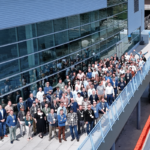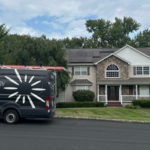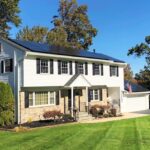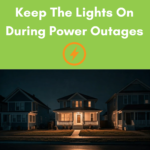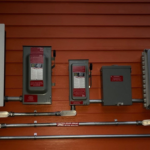Whether you’re looking forward to the seasonal shift or dreading the cold temperatures and snow, winter is upon us here in Rockland and Orange County. Are you worried about how your solar panels will fair now that summer is over?
If you assume the shorter days, lower angle of the sun in the sky and cold temperatures will have a detrimental impact on your solar panels during winter, you’ll be pleasantly surprised to learn that your investment in solar energy will continue to pay you back even during this time of year. Here’s why.
Cold Weather and Electricity Production
Many people falsely believe that heat from the sun is part of what makes solar panels more efficient in the summer than in the winter. However, solar panels actually produce more energy the colder it gets outside. On the other hand, they lose efficiency when the temperature climbs above the standard testing condition of 77 degrees F.
On a hot, sunny July day in Rockland County, electricity production from a solar array may appear to be at its peak, but due to the high heat, the panel could be easily be performing 6% or more below its capacity. Of course, the production loss that occurs on hot days varies from brand to brand. SunPower solar panels are one option that has proven their ability to perform better in high-temperature conditions.
Solar panels in general, including the SunPower brand, perform best in full sun and cool temperatures. This means solar panels working on a mild sunny day in winter could end up producing as much, if not more, electricity than panels exposed to the heat of a summer day.
Harsh Winter Conditions and Solar Panel Durability
Many people are concerned – and rightfully so – about the effect of warming temperatures during the day and subfreezing conditions at night. Just think of what these temperature fluctuations do to the streets! Water enters tiny cracks and freezes, expanding them ever so slightly. When this happens over and over all winter long, huge cracks and potholes form.
Is this the type of damage that occurs to your solar panels during winter? Fortunately, the answer is no – as long as you choose a modern solar panel with durable construction.
SunPower is one such brand. With its thick, tin-plated copper foundation and no metal located on the front at all, corrosion and cracks from fluctuating temperatures are much less likely to occur.
Damage from heavy snow and high winds is also unlikely when you choose SunPower, a brand praised for its superior strength in harsh conditions. After all, SunPower panels are installed in various climates around the world and have even been used on an expedition to Antarctica! Clearly, you have nothing to fear from a little New York wind and snow.
Electricity Consumption During Winter
There’s no denying that solar panels during winter produce less electricity than during summer, but think about the trend of your energy bills. If you have central air conditioning, your bills in summer could easily be twice what they are in winter, especially if you heat your home with a power source other than electricity.
In one example, a solar array is sized to cover 60% of a New York household’s summertime electricity bills. The homeowner runs the A/C a lot, but enjoys lower energy bills thanks to the solar array. In winter, this same setup could cover 90% of the household’s wintertime electricity bills. The overall energy production may be lower this time of year, but because electricity bills are cut in half, the solar panels are able to cover a higher percentage of the costs.
Consider a home with a solar array sized to cover 90% of summertime electricity bills. This would undoubtedly result in excess energy production in the winter. Fortunately, instead of being wasted, net metering allows the homeowner to sell the excess electricity back to the utility company. By choosing an annual reconciliation date sometime in the summer when electricity sells at the highest rate, the homeowner gets the biggest payback possible from energy produced with solar panels during winter.
Clouds and Solar Panel Performance
Don’t fret when you look outside and see an overcast sky. Your solar panels are still producing electricity thanks to the infrared light filtering through the clouds. After all, even though it’s not as bright outside, it’s certainly not pitch dark. As long as some light is coming through the clouds, you can expect your panels to produce energy.
You should certainly understand this concept if you’ve ever gotten sunburned on a cloudy day, but if you still have a hard time believing it, consider this: Germany produces more solar power than any other country in the world. The UK comes in second. As you probably know, Northern Europe is not known for its sunny weather. In fact, Germany has fewer sunny days per year on average than Alaska! Clearly, cloudy weather doesn’t put as much of a damper on solar productivity as people think.
Of course, not all panels are created equal when it comes to harnessing infrared light on a cloudy day. This type of light is diffused and scattered, much more so than visible light. The highest performing panels are those with anti-reflective glass on the surface designed to trap incoming light from all angles. SunPower panels have this feature, allowing them to capture more sun than conventional panels when it’s cloudy.
Snow Cover and Electricity Production
There’s no doubt that snow cover is a serious concern for solar panels during winter. If a blanket of snow covers the surface of your solar panels, it completely blocks out the sun. Fortunately, snow tends to melt quickly from solar panels with their angled position and orientation to the south or southwest. Once the snow starts melting, it quickly slides from the panels and onto the ground, restoring the ability to capture light from the sun.
Of course, if you have a sidewalk or driveway beneath the section of roof with solar panels, it may be wise to put a snow guard system in place. This keeps the snow from falling in a massive avalanche onto unsuspecting people or vehicles below. A snow guard is all in the name of safety, since it actually works to keep the ice and snow on your roof for a longer time. This brings energy production down to almost zero, but depending on what’s directly below the roof, lost production could be worth the added safety.
Are you ready to start relying on solar panels during winter? There’s no such thing as a bad time to install solar panels, so contact an installer in Rockland and Orange County today to get started!

